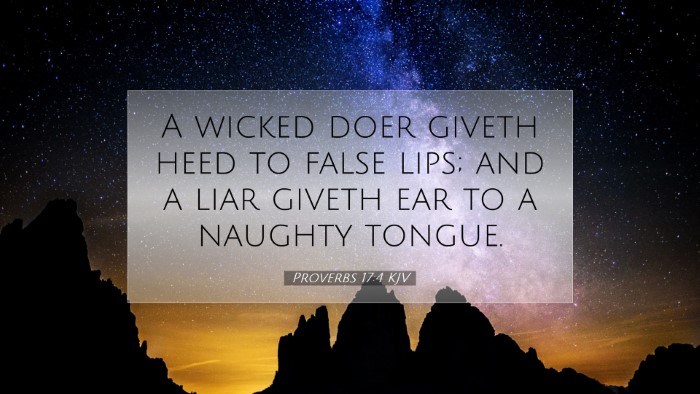Commentary on Proverbs 17:4
Proverbs 17:4 states:
"An evil doer listens to wicked lips; and a liar gives ear to a mischievous tongue."
Introduction
This verse presents a profound observation regarding human nature and the dangers of heeding the wrong counsel. It highlights the moral deterioration associated with those who are drawn to deceit and wickedness. Within this commentary, we will explore interpretations and insights from several esteemed public domain commentators.
Exegesis of Proverbs 17:4
The structure of this verse effectively encapsulates two contrasting types of individuals: the 'evil doer' and the 'liar'. Both characters exhibit a penchant for sinful behavior, suggesting a mutual relationship between evil and deceit. This interplay highlights the moral corruption inherent in listening to voices that peddle wickedness.
Insights from Matthew Henry
Matthew Henry describes the evil-doer as someone whose heart is inclined toward villainy. He notes that such individuals not only commit evil but are also particularly susceptible to being influenced by nefarious speech. Henry emphasizes:
- The Nature of Evil: The proclivity to listen indicates an affinity for wickedness. Listening to ‘wicked lips’ suggests a willingness to accept and validate wicked counsel.
- Dangerous Associations: Those who engage with liars often find themselves compromising their morals. Associating with such individuals can lead to a corrupted conscience.
- Discernment Required: True wisdom involves the ability to discern between righteous and wicked voices. The faithful must exercise caution in whom they choose to listen to.
Insights from Albert Barnes
Albert Barnes offers a scholarly examination of the verse, focusing on the idea that communication vastly influences character and conduct. He points out:
- The Pathology of Listening: Barnes notes how the act of listening to wickedness can entrench bad behavior. The metaphor of ‘giving ear’ underscores a passive acceptance of the evil being spoken.
- Connection to Character: The propensity to listen to deceitful speech is indicative of one’s internal disposition. Those who embrace lies are likely to be evildoers themselves.
- Spiritual Ramifications: Barnes highlights that this verse serves as a warning against the spiritual pitfalls of engaging with wicked influences, affecting one's standing before God.
Insights from Adam Clarke
Adam Clarke contributes a nuanced perspective by elaborating on the nature of speech and its moral implications. He identifies several key themes:
- Wicked Speech as a Trap: Clarke implies that listening to wicked words can ensnare the soul, leading to a path of destruction.
- The Importance of Righteous Speech: The contrast between evil speech and righteous discourse is immense; the latter uplifts and edifies, while the former degrades.
- Consequences of Association: Clarke posits that one's company and the speeches they entertain can have profound effects—discerning should be at the forefront of one's social interactions.
Theological Reflection
In light of these commentaries, Proverbs 17:4 serves as a theological touchstone regarding the nature of sin and its allure. It emphasizes the volatile connection between listener and speaker, showcasing how one's choice in whom they permit to influence them is paramount in a life of righteousness.
Practical Applications
For pastors, students, and scholars, Proverbs 17:4 offers several practical applications:
- Cultivating Discernment: It is crucial to develop an ear for what is righteous and pure, screening out the noise of falsehood.
- Building Strong Communities: Creating spaces where only righteous discourse is encouraged can foster a healthy spiritual environment.
- Preaching Against Wickedness: Pastors should not shy away from preaching about the destructive power of wicked influences in the lives of congregants.
Conclusion
Proverbs 17:4 encapsulates a vital truth regarding the human condition: that our choices in what we listen to reveal the state of our hearts. By valuing wisdom and righteousness, believers can navigate through the complexities of life and emerge spiritually unscathed from the siren calls of wickedness.


